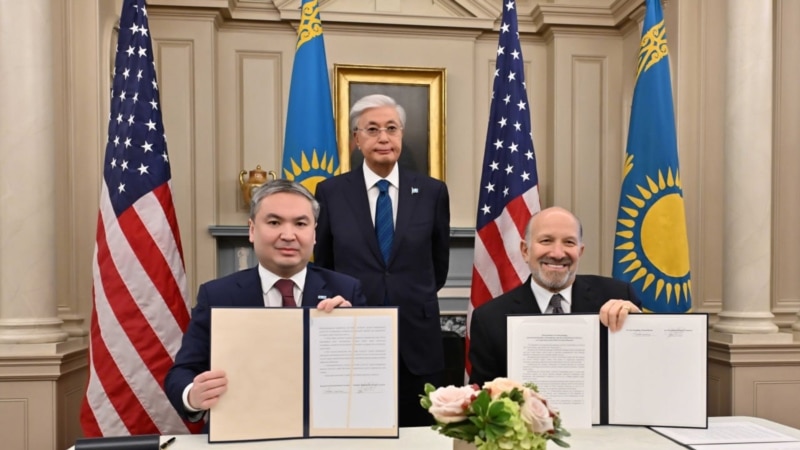US President Donald Trump unveiled a slew of trade, diplomatic, and mineral deals as he hosted Central Asia’s five leaders for a summit and dinner aimed at shoring up Washington’s influence in the region.
On November 6, Kazakh and US officials announced a new joint partnership to develop one of the world’s largest untapped deposits of tungsten in Kazakhstan. The deal will see the US company Cove Kaz Capital Group take a 70 percent stake in the venture alongside Kazakhstan’s state mining firm. It is estimated to cost $1.1 billion, with the US Export-Import Bank issuing a letter of interest to fund $900 million.
Among other key outcomes from the summit was a yet-to-be-fully detailed agreement to sell up to a combined 37 Boeing jets to the national airlines of Kazakhstan, Tajikistan, and Uzbekistan. Additionally, an agreement was reached for Starlink — the satellite Internet service provider owned by business mogul Elon Musk — to integrate its services with networks from the telecoms company Veon, starting with its operator in Kazakhstan, Beeline.
On the diplomatic front, Kazakh President Qasym-Zhomart Toqaev announced that Kazakhstan will join the Abraham Accords, the US-led framework fostering cooperation between Israel and Arab and Muslim nations.
US officials emphasized that the summit with the presidents of Kazakhstan, Kyrgyzstan, Tajikistan, Turkmenistan, and Uzbekistan signals a renewed US commitment to engage more steadily with the region.
“We oftentimes spend so much time focused on crises and problems and they deserve attention that sometimes we don’t spend enough time focused on exciting new opportunities,” said US Secretary of State Marco Rubio at a working breakfast with the five Central Asian leaders on November 6. “And that’s what exists here now: an exciting new opportunity in which the national interests of our respective countries are aligned.”
### A New Chapter in Central Asia’s US Relations
Central Asia is seeking to balance its trade and security relationships, traditionally dominated by China and Russia, by deepening ties with the United States. This Washington summit follows other efforts by major powers this year to strengthen connections with the region.
In September, Russian President Vladimir Putin joined a summit in Tajikistan with other Central Asian leaders, while Chinese President Xi Jinping traveled to Kazakhstan in June for meetings with regional presidents. The European Union also held a summit with Central Asian leaders in April in Uzbekistan, focusing on infrastructure investments and access to the region’s critical minerals.
Mineral wealth remained a focal point in Washington. Central Asia’s rich reserves of rare earth elements — 17 elements vital for technologies ranging from wind turbines and smartphones to fighter jet engines — alongside vast deposits of uranium, copper, gold, and other strategic minerals, are essential to global efforts transitioning to greener energy sources.
Pini Althaus, CEO of Cove Kaz Capital Group, described the tungsten agreement as “a generational win for the U.S. and its critical minerals needs.” He told Reuters that Trump and US Commerce Secretary Howard Lutnick helped negotiate the deal to prevent Chinese companies from developing the strategic deposit.
Ben Godwin, head of analysis at PRISM, a London-based strategic intelligence firm, explained to RFE/RL that Central Asian leaders have long used their mineral wealth as leverage to draw more US engagement on other critical regional issues. “In the 2000s, it was the War on Terror and oil and gas. Then there was a decarbonization era where many new projects in Central Asia centered around renewable energy,” Godwin said. “Now it’s the role of critical minerals in national security.”
The timing of these deals follows a truce in the Beijing-Washington trade war and rising competition between the US and China over the export of rare earth elements — a key point of contention in their negotiations. In late October, a meeting between Trump and Xi resulted in a one-year pause on some Chinese export restrictions on rare earths.
Washington is now seeking alternative avenues to reduce dependence on Beijing for these essential metals. China currently accounts for nearly 70 percent of the world’s rare earth mining and controls roughly 90 percent of their processing.
While Central Asia could be a long-term source for these minerals, the region hopes that much-needed new investments will help unlock its resource potential. A recent report by the Center for Strategic and International Studies (CSIS), a Washington-based think tank, noted that “Chinese and Russian capital dominate the region’s mining, processing, and logistics networks,” while warning that “structural barriers, ranging from underdeveloped westward transport routes to recurring energy shortages, continue to deter Western investment.”
### Kazakhstan Joins US Diplomatic Push on the Abraham Accords
Kazakhstan’s decision to join the Abraham Accords—a hallmark achievement of Trump’s first term—places the country at the heart of a new White House effort to reinvigorate this foreign policy initiative.
The Abraham Accords were designed to foster cooperation between Israel and the Muslim world, with the United Arab Emirates, Bahrain, and Morocco signing the agreement in 2020 to normalize relations with Israel.
The Trump administration is reportedly seeking to expand the initiative, which will be a key focus of a planned visit to Washington on November 18 by Saudi Crown Prince Mohammed bin Salman.
President Toqaev held a phone call with Israeli Prime Minister Benjamin Netanyahu to announce Kazakhstan’s intention to join the Accords, although Kazakhstan has maintained full diplomatic ties with Israel for more than 30 years.
Joseph Epstein, director of the Washington-based Yorktown Institute’s Turan Research Center, told RFE/RL that although Kazakhstan’s move may seem symbolic, it could carry diplomatic significance going forward.
“Astana’s decision to join the Abraham Accords marks the beginning of a new phase, transforming the accords from a Middle East peace initiative to a pro-US coalition of moderate Muslim countries devoted to tolerance and prosperity,” Epstein said.
—
This summit signals a significant shift as Central Asia seeks to diversify its global partnerships and as the United States strengthens its position in a geopolitically vital region rich in strategic resources.
https://www.rferl.org/a/central-asia-trump-critical-minerals-diplomatic-deals-summit/33583397.html
